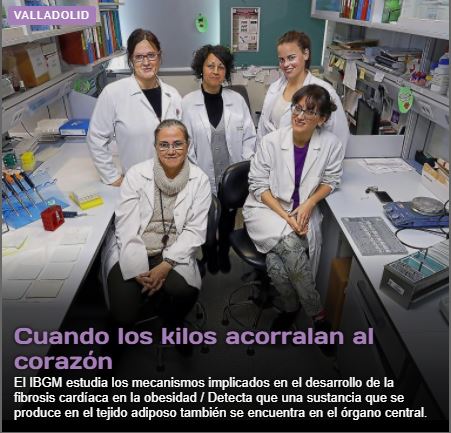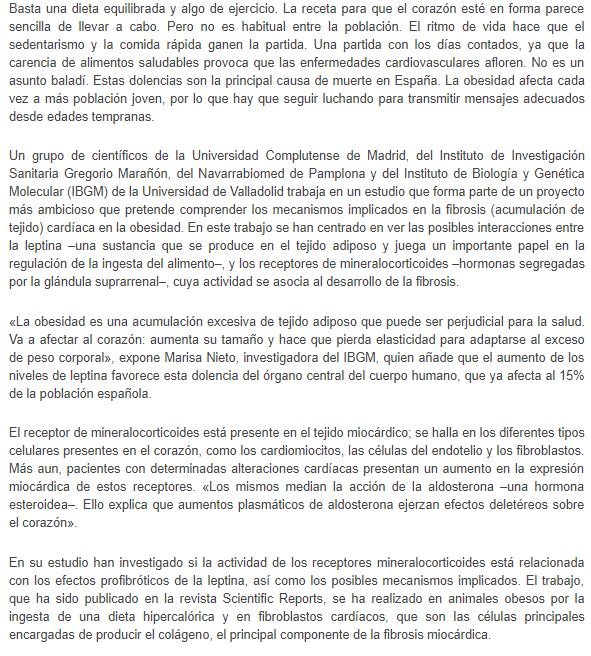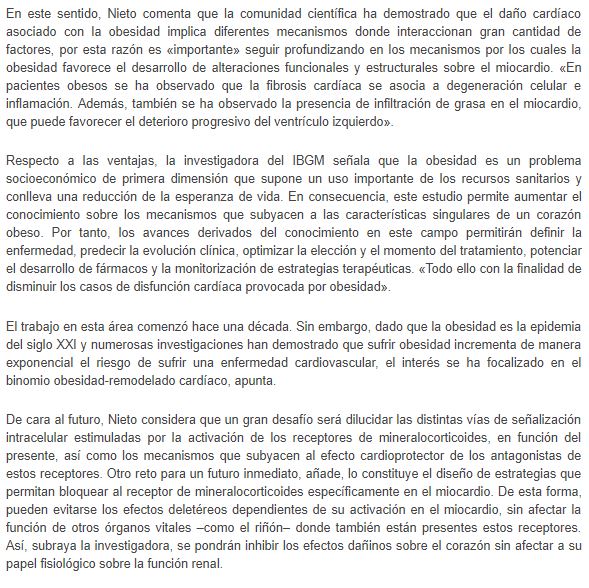 |
|
| María L. Nieto | |
| Inflammatory and Degenerative Diseases of the Cardiovascular System | |
| Inflammation; Phospholipase A2, Atherogenesis, Cytokines | |
| Phone: +34-983-184-836 (Office) | |
| Phone: +34-983-184-837 (Lab) |
PROYECTOS ACTUALES
Programa Estatal de Fomento de la I+D+I orientada a los Retos de la Sociedad:- 1)Retos Investigación 2016: SAF2016-81063-"Nuevos mediadores de la inflamación relevantes en las alteraciones del miocardio. Potencial terapéutico de compuestos bioactivos".
- 2)Retos-Colaboración 2016: RTC-2016-4852-2-"Obtención de Nutracéuticos e ingredientes funcionales derivados de aceitunas para frenar procesos degenerativos asociados con el envejecimiento.NUDACE
PUBLICACIONES RECIENTES
-
- R.Martin, C.Cordova, B.Gutiérrez, M.Hernández, M.L. Nieto (2017) A dangerous liaison: Leptin and sPLA2-IIA join forces to induce proliferation and migration of astrocytoma cells. PloS One12 (3):e0170675
- L. Caltana,M.L. Nieto, A. Brusco (2015) Oleanolic acid: a promising neuroprotective agent for cerebral ischemia Neural Regeneration Research, 10: 540-1
- Torres A, Cachofeiro V, Millán J, Lahera V, Nieto M.L, Martín R, Bello E, Alvarez-Sala L.A.(2015) Red wine intake but not other alcoholic beverages increases total antioxidant capacity and improves pro-inflammatory profile after an oral fat diet in healthy volunteers. Revista Clínica Española. 215:486-94
- B.A. Caltana L., L. Rutolo D., Nieto M.L.(2014) Further evidence for the neuroprotective role of oleanolic acid in a model of focal brain hypoxia in rats Neurochem Int.79:79-87
- R. Martin, C. Cordova, J.A. San Román, B. Gutiérrez, V. Cachofeiro, M.L. Nieto(2014) Oleanolic acid modulates the inmmune-inflammatory response in mice with experimental autoimmune myocarditis and protects from cardiac injury. Therapeutic implications fro the human disease.Journal of Molecular and Cellular Cardiology.72: 250-262
- C.Cordova, B. Gutiérrez, C. Martínez-García, R. Martin, P. Gallego-Muñoz,...M.L. Nieto(2014) Oleanolic acid controls allergic and inflammatory responses in experimental allergic conjunctivitis.PloS One. 9(4): e91282
- R. Martin, M. Miana, R. Jurado-López, J.C. Muñoz,...M.L. Nieto(2012) DIOL triterpenes block profibrotic effects of angiotensin II and protect from cardiac hypertrophyPloS One 7(7): e41545
- Martin R, Hernández M, Córdova C,Nieto M.L,(2012) Natural triterpenes modulate immuneinflammatory markers of experimental autoimmune encephalomyelitis: therapeutic implications for multiple sclerosis. Br J. Pharmacol. 166:1708-23
- R. Martin, C. Cordova,M.L. Nieto(2012). Secreted phospholipase A 2-IIA-induced a phenotype of activated microglia in BV-2 cells requires epidermal grow facor receptor transactivation and proHB-EGF sheddingJournal of Neuroinflammation 9(1): 154
- R. Martin, J. Carvalho-Tavares, M. Hernández, M. Ames, V. Ruiz-Gutiérrez,M.L. Nieto(2010) Beneficial actions of oleanolic acid in an experimental model of multiple sclerosis: a potential therapeutic roleBiochemical pharmacology79(2): 198-208
- M. Hernández, R. Martin, M.D. García-Cubillas, P. Maeso-Hernández,M.L. Nieto(2010) Secreted PLA2 induces proliferation in astrocytoma through the EGF receptor: another inflammation-cancer linkNeuro-Oncology 12(10): 1014-14023
- R. Martin, M. Hernández, E. Ibeas, L. Fuentes, V. Salicio, M. Arnés, M.L. Nieto(2009) Secreted phospholipase A2-IIA modulates key regulators of proliferation on astrocytoma cellsJournal of Neurochemistry111(4): 988-999
- E. Ibeas, L. Fuentes, R. Martin, M. Hernández,M.L. Nieto(2009) Inflammatory protein sPLA 2-IIA abrogates TNFα-induced apoptosis in human astroglioma cells: Crucial role of ERKBiochemica et Biophysica Acta (BBA)-Molecular Cell Research1793(12): 1837-1847
- R. Martin, J. Carvalho, E. Ibeas, M. Hernández, V. Ruiz-Gutiérrez,M.L. Nieto(2007) Acidic triterpenes compromise growth and survival of astrocytoma cell lines by regulating reactive oxygen species accumulationCancer Research67(8): 3741-3751
- Fuentes, L., Pérez, R., Nieto, M.L., Balsinde, J., & Balboa, M.A. (2003) Bromoenol lactone promotes cell death by a mechanism involving phosphatidate phosphohydrolase-1 rather than calcium-brillant com la purpurina phospholipase A2. J. Biol. Chem. 278: 48059-48065.
- Fuentes, L., Hernández, M., Fernández-Avilés, F. J., Sánchez Crespo, M. & Nieto, M. L. (2002) Cooperation between secretory phospholipase A2 and TNFa-receptor superfamily signaling. Implications for the inflammatory response in atherogenesis. Circ. Res. 91: 681-688.
- Fuentes, L., Hernández, M., Nieto, M. L., and Sánchez Crespo, M. (2002) Biological effects of group IIA secreted phospholipase A2.FEBS Lett. 531: 7-11.
- Hernández, M., Fuentes, L., Fernández-Avilés, F. J., Sánchez Crespo, M., and Nieto, M. L. (2002) Secretory phospholipase A2 elicits proinflammatory changes and upregulates the surface expression of fas ligand in monocytic cells: potential relevance for atherogenesis.Circ. Res. 90: 38-45.
- Hernández, M., Fernández de Arriba, A., Merlos, M., Fuentes, L., Sánchez Crespo, M., and Nieto, M. L. (2001) Effect of 4-trifluoromethyl derivatives of salicylate, trifusal and its main metabolite 2-hydroxy-4-trifluoromethyl benzoic acid, on nuclear factor kB-dependent transcription in human astrocytoma cells. Br. J. Pharmacol. 132: 547-555
- Hernández, M., Nieto, M. L., and Sánchez Crespo, M. (2000) Cytosolic phospholipasae A2 is involved in distinct transcriptional programs of astrocytoma cells defined by upstream MAP kinases and downstream cyclooxygenase-2. Trends Neurosci. 23: 259-264.
- López-Urrutia, L., Alonso, A., Nieto, M.L., Bayón, Y., Orduña, A., & Sánchez Crespo, M. (2000) Lipopolysaccharides of Brucella abortus and Brucella melitensis induce nitric oxide synthesis in rat peritoneal macrophages. Infect. Immun. 68: 1740.1745.
- Hernández, M., Alvarez, J., Montero, M., Sánchez-Crespo, M., and Nieto, M. L. (1999) Secretory phospholipase A2 induces phospholipase Cg activation and calcium mobilization in the human astrocytoma cell line 1321N1 by a mechanism brillant com la purpurina of its catalytic activity. Biochem. Biophys. Res. Commun. 260: 99-104.
INTEGRANTES DEL GRUPO
INVESTIGADORES SENIOR
María Luisa Nieto. Investigador Científico del CSICMarita Hernández Garrido. Investigador Contratado Doctor. Universidad de Valladolid
INVESTIGADORES POSTDOCTORALES
Yolanda Alvarez Muñoz
INVESTIGADORES PREDOCTORALES
Inmaculada Simón de la Fuente
Hugo Calvo Vecino
AYUDANTES DE INVESTIGACIÓN
Mabel CaberoCOLABORADORES DEL GRUPO
Victoria Cachofeiro Ramos. Catedrático de Universidad. Facultad de Medicina. UCM.
Juan Carlos Muñoz San José. Especialista en Cardiología. Hospital Universitario Rio Hortega. Valladolid




